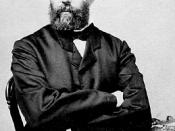Transcendentalism was an intellectual movement founded by Ralph Waldo Emerson. There are three cornerstones of the Transcendentalist belief which are
* Human senses are limited; they convey knowledge of the physical world, but deeper truths can be grasped only through intuition.
* The observation of nature illuminates the nature of human beings.
* God, nature, and humanity are united in a shared universal soul.
(pg. 387 under Literary Analysis)
Our human senses are limited to what we have in the physical world. But the more profound truth can be obtained only by our instincts.
By observing nature, we as human beings become enlighten and understand certain things.
God, nature and the human race are related to one another because we are all part of one.
------------------------------------------------------------------------------------------------------------
One example of Transcendentalism is the quote from Nature by Ralph Waldo Emerson on page 389 in the 1st line, which states "I become a transparent eyeball; I am nothing; I see all; the currents of the Universal Being circulate through me; I am part or parcel of God."
This quote shows the transcendental belief that God, nature, and humanity are united in a shared universal soul. The quote shows this belief by saying that nature allows us to become separated from the daily routine of the world so that we take some time to see everything and feel that we are part of nature and part of God.
Another example of Transcendentalism is the short quote from Walden by Henry David Thoreau on page 406 in the last sentence at the top of the page. Here it states "Olympus is but the outside of the Earth everywhere..." Here he shows the transcendental belief that the observation of nature illuminates the nature of human beings. In the quote he talks of Mount Olympus...


